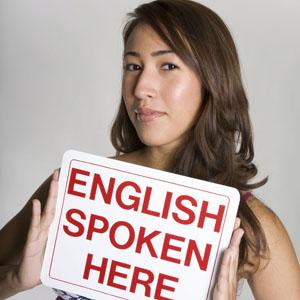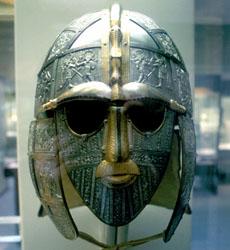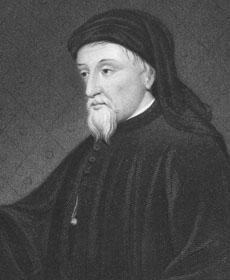
STEVE EMBER: This is Steve Ember.
SHIRLEY GRIFFITH: And this is Shirley Griffith with the VOA Special English program EXPLORATIONS. Today we present the first of two programs about the history of the English Language.
(MUSIC)
STEVE EMBER: More people are trying to learn English than any other language in the world. English is the language of political negotiations and international business. It has become the international language of science and medicine. International treaties say passenger airplane pilots must speak English.
English is the major foreign language taught in most schools in South America and Europe. School children in the Philippines and Japan begin learning English at an early age. English is the official language of more than 75 countries including Britain, Canada, the United States, Australia, and South Africa.
In countries where many different languages are spoken, English is often used as an official language to help people communicate. India is good example. English is the common language in this country where at least 24 languages are spoken by more than one million people.
(MUSIC)
SHIRLEY GRIFFITH: Where did the English language come from? Why has it become so popular? To answer these questions we must travel back in time about 5,000 years to an area north of the Black Sea in southeastern Europe.
Experts say the people in that area spoke a language called Proto-Indo-European. That language is no longer spoken. Researchers do not really know what it sounded like.
Yet, Proto-Indo-European is believed to be the ancestor of most European languages. These include the languages that became ancient Greek, ancient German and the ancient Latin.
Latin disappeared as a spoken language. Yet it left behind three great languages that became modern Spanish, French and Italian. Ancient German became Dutch, Danish, German, Norwegian, Swedish and one of the languages that developed into English.
STEVE EMBER: The English language is a result of the invasions of the island of Britain over many hundreds of years. The invaders lived along the northern coast of Europe.
The first invasions were by a people called Angles about 1,500 years ago. The Angles were a German tribe who crossed the English Channel. Later two more groups crossed to Britain. They were the Saxons and the Jutes.
These groups found a people called the Celts, who had lived in Britain for many thousands of years. The Celts and the invaders fought.

After a while, most of the Celts were killed, or made slaves. Some escaped to live in the area that became Wales. Through the years, the Saxons, Angles and Jutes mixed their different languages. The result is what is called Anglo-Saxon or Old English.
Old English is extremely difficult to understand. Only a few experts can read this earliest form of English.
SHIRLEY GRIFFITH: Several written works have survived from the Old English period. Perhaps the most famous is called Beowulf. It is the oldest known English poem. Experts say it was written in Britain more than 1,000 years ago. The name of the person who wrote it is not known.
Beowulf is the story of a great king who fought against monsters. He was a good king, well liked by his people. Listen as Warren Scheer reads the beginning of this ancient story in modern English.
WARREN SCHEER:
So. The Spear-Danes in days gone by
and the kings who ruled them had courage and greatness.
We have heard of those princes' heroic campaigns.
There was Shield Sheafson, scourge of many tribes,
a wrecker of mead-benches, rampaging among foes.
This terror of the hall-troops had come far.
A foundling to start with, he would flourish later on
as his powers waxed and his worth was proved,
In the end each clan on the outlying coasts
beyond the whale-road had to yield to him
and begin to pay tribute. That was one good king.
STEVE EMBER: The next great invasion of Britain came from the far north beginning about 1,100 years ago. Fierce people called Vikings raided the coast areas of Britain. The Vikings came from Denmark, Norway and other northern countries. They were looking to capture trade goods and slaves and take away anything of value.
In some areas, the Vikings became so powerful they built temporary bases. These temporary bases sometimes became permanent. Later, many Vikings stayed in Britain.
Many English words used today come from these ancient Vikings. Words like "sky," "leg," "skull," "egg," "crawl," " lift" and "take" are from the old languages of the far northern countries.
(MUSIC)
SHIRLEY GRIFFITH: The next invasion of Britain took place more than 900 years ago, in 1066. History experts call this invasion the Norman Conquest. William the Conqueror led it.
The Normans were a French-speaking people from Normandy in the north of France. They became the new rulers of Britain. These new rulers spoke only French for several hundred years. It was the most important language in the world at that time. It was the language of educated people. But the common people of Britain still spoke Old English.
Old English took many words from the Norman French. Some of these include "damage," "prison," and "marriage." Most English words that describe law and government come from Norman French. Words such as "jury," "parliament," and "justice."
The French language used by the Norman rulers greatly changed the way English was spoken by 800 years ago.
English became what language experts call Middle English. As time passed, the ruling Normans no longer spoke true French. Their language had become a mix of French and Middle English.

STEVE EMBER: Middle English sounds like modern English. But it is very difficult to understand now. Many written works from this period have survived. Perhaps the most famous was written by Geoffrey Chaucer, a poet who lived in London and died there in 1400. Chaucer's most famous work is "The Canterbury Tales," written more than 600 years ago.
"The Canterbury Tales" is a collection of poems about different people traveling to the town of Canterbury. Listen for a few moments as Warren Scheer reads the beginning of Chaucer's famous "Canterbury Tales."
WARREN SCHEER:
Whan that aprill with his shoures soote
The droghte of march hath perced to the roote,
And bathed every veyne in swich licour
Of which vertu engendred is the flour;
Whan zephirus eek with his sweete breeth
Inspired hath in every holt and heath...
Now listen as Mr. Scheer reads the same sentences again, but this time in Modern English.
WARREN SHEER:
When April with his showers sweet with fruit
The drought of March has pierced unto the root
And bathed each vein with liquor that has power
To generate therein and sire the flower;
When Zephyr also has, with his sweet breath,
Quickened again, in every holt and heath,
The tender shoots and buds, and the young sun...
SHIRLEY GRIFFITH: English language experts say Geoffrey Chaucer was the first important writer to use the English language. They also agree that Chaucer's great Middle English poem gives us a clear picture of the people of his time.
STEVE EMBER: The prologue you just heard describes a group of religious travelers going to Canterbury. To entertain themselves, they agree to tell stories while they travel.
The Knight's Tale is about two men who compete for the love of a beautiful woman. The Miller's Tale is a funny story that tells about a young man who is in love with a married woman. The two play a mean trick on the woman's old husband.
One of the most famous characters in the series of stories is the Wife of Bath. She is a strong, and opinionated woman who likes to talk about her many adventures in life and marriage.
Some of the people described in "The Canterbury Tales" are wise and brave; some are stupid and foolish. Some believe they are extremely important. Some are very nice, others are mean. But they all still seem real.
The history of the English language continues as Middle English becomes Modern English, which is spoken today. That will be our story next time.
SHIRLEY GRIFFITH: This program was written and produced by Paul Thompson. This is Shirley Griffith.
STEVE EMBER: And this is Steve Ember. Join us again next week to hear the second part of the History of the English Language on the VOA Special English program, EXPLORATIONS.
How English became a modern language
Are you learning English? These songs may help
(來源:VOA 編輯:崔旭燕)
